Buon giorno! We're in Bologna at Il Cinema Ritrovato. Till 2 July, all EFSP posts will highlight festival sections and today we start with the section A hundred years ago: 50 films of 1917. It contains some fifty films, documentaries, fragments and animation films, including such masterful works like Yakov Protazanov’s Ne nado krovi/Blood Need Not Be Spilled, starring Ivan Mozzhukhin, amazing actresses like Maria Orska, Pola Negri and Pauline Starke and popular idols like Gunnar Tolnæs. Some of the 12 postcards in this post were also used for the catalogue of Il Cinema Ritrovato 2017.
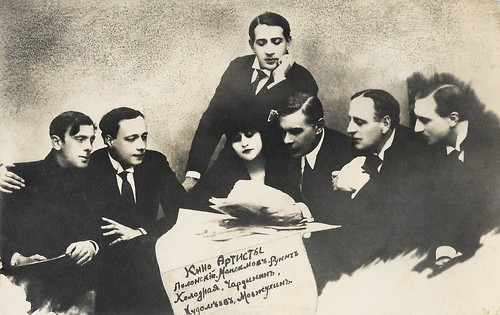
The Russian film scene, ca. 1917. From left to right: Vitold Polonsky, Vladimir Maksimov, Vera Kholodnaya, Ossip Runitsch (in the back), Petr Cardynin, Ivan Khudoleyev, and Ivan Mozzhukin. Russian postcard. Collection: Didier Hanson.
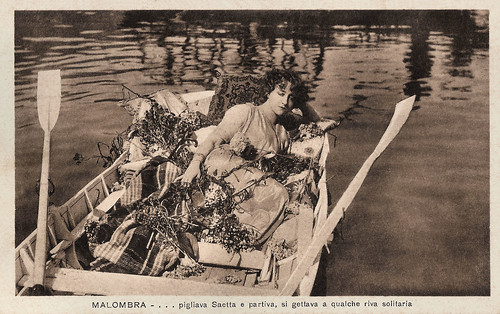
Italian postcard for the silent film Malombra (Carmine Gallone, 1917), adapted from the novel by Antonio Fogazzaro, and starring Lyda Borelli. Caption: "...Saetta seized [the oars] and left, moving towards some solitary shore."
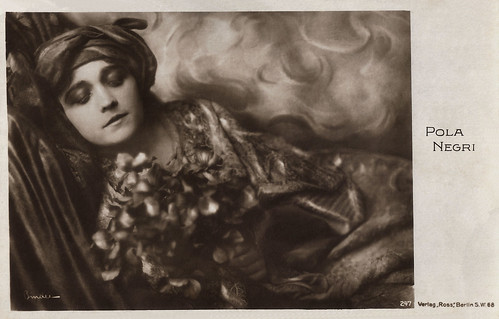
Pola Negri, ca. 1919. German postcard by Ross Verlag, no. 247. Photo: Alex Binder. Negri stars in the Polish film Bestia/The Polish Dancer (Aleksander Hertz, 1917).
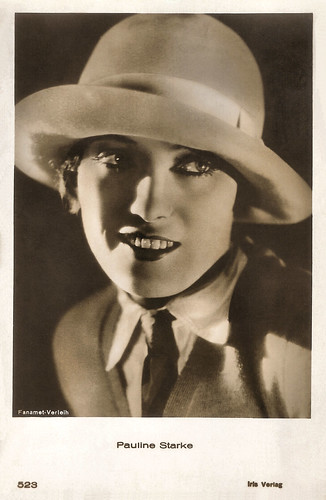
Pauline Starke. Austrian postcard by Iris Verlag, no. 523. Photo: Fanamet Verleih. At Bologna, Starke can be seen in Until They Get Me (Frank Borzage, 1917).
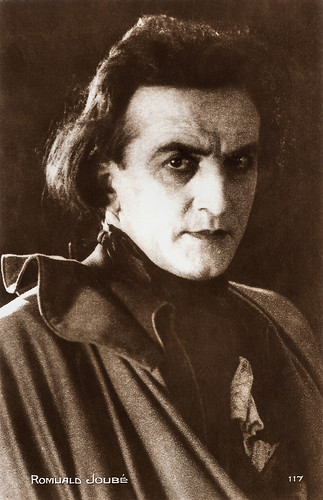
Romuald Joubé. French postcard by Editions Cinémagazine, no. 117. Joubé appears in Le coupable/The guilty party (André Antoine, 1917).
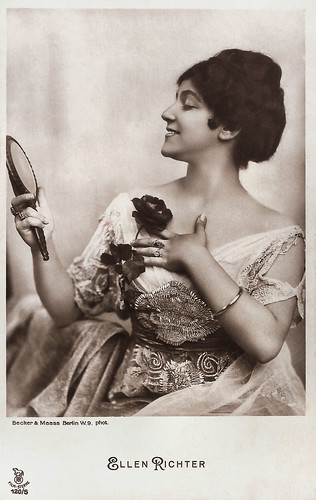
Ellen Richter. German postcard in the Film-Sterne series by Rotophot, no. 120/5. Photo: Becker & Maass, Berlin. Richter was the star of Das Bacchanal des Todes/The Bacchanal of Death (Richard Eichberg, 1917).
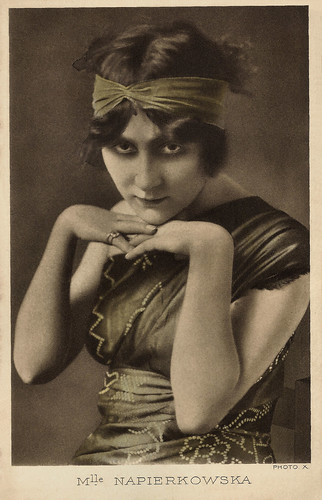
Stacia Napierkowska. French postcard. Photo X. She stars in La tragica fine di Caligula Imperator/Caligula (Ugo Falena, 1917).
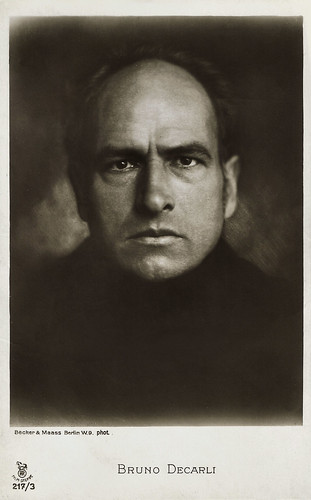
Bruno Decarli. German postcard in the Film-Sterne series by Rotophot, no. 217/3. Photo: Becker & Maass, Berlin. Decarli plays a man haunted by a misdeed he has committed in Furcht/Fear (Robert Wiene, 1917).
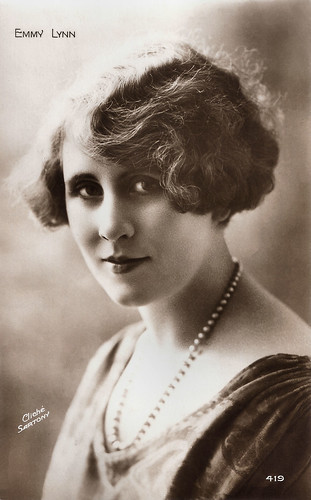
Emmy Lynn. French postcard by Editions Cinémagazine, no. 419. Photo: Sartony. Lynn plays one of the leads in Mater Dolorosa/Sorrowful Mother (Abel Gance, 1917).
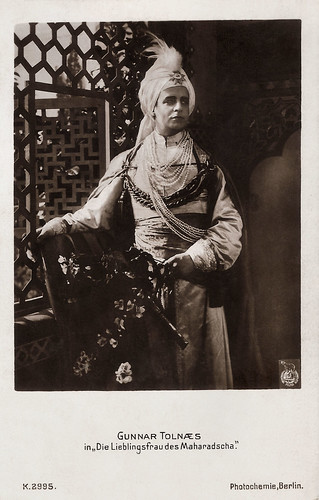
German postcard by Photochemie, Berlin, no. K. 2995. Photo: Nordisk. Publicity still for Maharadjahens Yndlingshustru/The Maharajah's Favourite Wife (Robert Dinesen, 1917), starring Gunnar Tolnaes as an Indian prince. Tolnaes had his most famous performance in this Danish orientalist melodrama. It was so popular that it had a Danish sequel in 1919, and a German sequel in 1921.
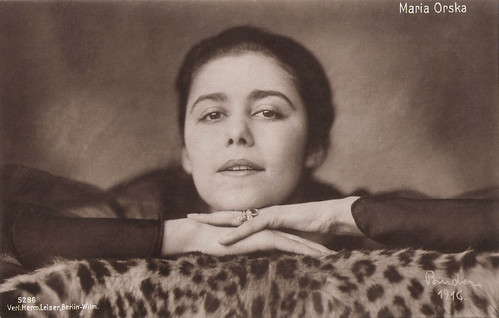
Maria Orska. German postcard by Verlag Hermann Leiser, Berlin-Wilm., no. 5286. Photo: Alex Binder, 1916. She can be seen at Il Cinema Ritrovato in Die schwarze Loo/The Black Loo (Max Mack, 1917).
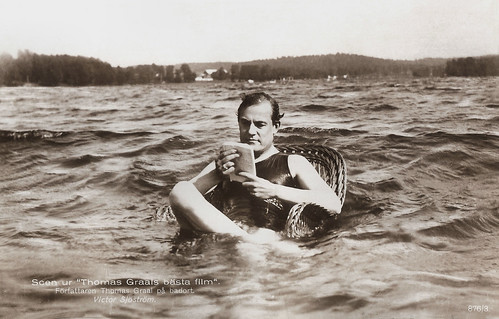
Swedish postcard by Ed. Nordisk Konst, Stockholm, no. 876/3. Photo: publicity still for the comedy Thomas Graals bästa film/Thomas Graal's Best Film (Mauritz Stiller, 1917), scripted by Gustav Molander. The story deals with screenwriter Thomas Graal (Victor Sjöström) who falls in love with his secretary Bessie (Karin Molander) and imagines himself rescuing her from poverty. Reality is quite different as Bessie is a modern woman. The film also mocks the bored aristocracy involved in the modernity of filmmaking. Caption: "The author Thomas Graal at sea."
Source: Il Cinema Ritrovato.

The Russian film scene, ca. 1917. From left to right: Vitold Polonsky, Vladimir Maksimov, Vera Kholodnaya, Ossip Runitsch (in the back), Petr Cardynin, Ivan Khudoleyev, and Ivan Mozzhukin. Russian postcard. Collection: Didier Hanson.

Italian postcard for the silent film Malombra (Carmine Gallone, 1917), adapted from the novel by Antonio Fogazzaro, and starring Lyda Borelli. Caption: "...Saetta seized [the oars] and left, moving towards some solitary shore."

Pola Negri, ca. 1919. German postcard by Ross Verlag, no. 247. Photo: Alex Binder. Negri stars in the Polish film Bestia/The Polish Dancer (Aleksander Hertz, 1917).

Pauline Starke. Austrian postcard by Iris Verlag, no. 523. Photo: Fanamet Verleih. At Bologna, Starke can be seen in Until They Get Me (Frank Borzage, 1917).

Romuald Joubé. French postcard by Editions Cinémagazine, no. 117. Joubé appears in Le coupable/The guilty party (André Antoine, 1917).

Ellen Richter. German postcard in the Film-Sterne series by Rotophot, no. 120/5. Photo: Becker & Maass, Berlin. Richter was the star of Das Bacchanal des Todes/The Bacchanal of Death (Richard Eichberg, 1917).

Stacia Napierkowska. French postcard. Photo X. She stars in La tragica fine di Caligula Imperator/Caligula (Ugo Falena, 1917).

Bruno Decarli. German postcard in the Film-Sterne series by Rotophot, no. 217/3. Photo: Becker & Maass, Berlin. Decarli plays a man haunted by a misdeed he has committed in Furcht/Fear (Robert Wiene, 1917).

Emmy Lynn. French postcard by Editions Cinémagazine, no. 419. Photo: Sartony. Lynn plays one of the leads in Mater Dolorosa/Sorrowful Mother (Abel Gance, 1917).

German postcard by Photochemie, Berlin, no. K. 2995. Photo: Nordisk. Publicity still for Maharadjahens Yndlingshustru/The Maharajah's Favourite Wife (Robert Dinesen, 1917), starring Gunnar Tolnaes as an Indian prince. Tolnaes had his most famous performance in this Danish orientalist melodrama. It was so popular that it had a Danish sequel in 1919, and a German sequel in 1921.

Maria Orska. German postcard by Verlag Hermann Leiser, Berlin-Wilm., no. 5286. Photo: Alex Binder, 1916. She can be seen at Il Cinema Ritrovato in Die schwarze Loo/The Black Loo (Max Mack, 1917).

Swedish postcard by Ed. Nordisk Konst, Stockholm, no. 876/3. Photo: publicity still for the comedy Thomas Graals bästa film/Thomas Graal's Best Film (Mauritz Stiller, 1917), scripted by Gustav Molander. The story deals with screenwriter Thomas Graal (Victor Sjöström) who falls in love with his secretary Bessie (Karin Molander) and imagines himself rescuing her from poverty. Reality is quite different as Bessie is a modern woman. The film also mocks the bored aristocracy involved in the modernity of filmmaking. Caption: "The author Thomas Graal at sea."
Source: Il Cinema Ritrovato.
No comments:
Post a Comment